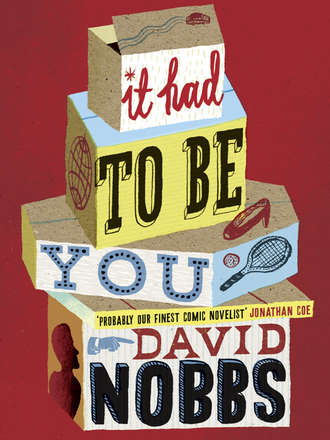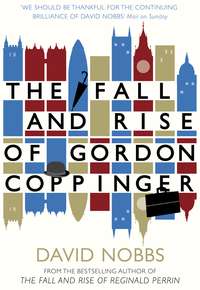
Полная версия
It Had to Be You
He chewed on his next morsel of dough ball as if he couldn’t bear the pleasure to end.
‘… close the London office and you could all join us here in Birming-ham.’
Dwight Schenkman pronounced England’s second city as if it was a type of meat.
James’s heart sank. Even the arrival of his pizza capricciosa couldn’t lift it.
She was more than three-quarters of an hour late now. He was in turmoil. He stared wildly at the door, willing her to hurry in. But he knew in his heart that she wouldn’t.
He had ruled out the possibility that she had had second thoughts. Apart from the fact that there was no reason why she should – they had talked about it and talked about it and she had committed herself and told him how much she loved him and told him of James’s lack of real passion in recent years – there was also his knowledge of her character. She was a woman of courage, of spirit, of compassion, of style. If she had had second thoughts, she would have phoned to tell him.
He began to think about the possibility of an accident. He could barely allow himself to believe that she would have had a bad accident. His happiness, his utterly unexpected happiness, was not to be taken away so cruelly. But a minor accident, that would be what it was.
If it was a very minor accident, though, she would have been able to phone.
So why didn’t he phone her? Not in the restaurant, though. It was too quiet. Too many people were eating in whispers, in that strange, overawed English way.
He strolled out into the garden, slowly, trying to look casual.
He had chosen this remote spot so well that there was no network coverage.
He returned to his table, smiled at the lunchers and sat down, trying to look as if he hadn’t a care in the world.
Round and round went his mind.
He told himself that he had lived without her reasonably happily for fifty-one years. Surely he could manage another thirty or so?
He knew that this was nonsense.
He caught the eye of the plump, plain woman. She had a stern, stiff look on her face, and traces of tiramisu on both her chins. He had a sudden fear that he knew her, and that, therefore, she knew him. He smiled at her, trying to make the smile look casual and relaxed. She gave a defensive half-smile in response, as if she wasn’t sure whether she knew him.
What did it matter, anyway? Deborah hadn’t come. Nothing had happened.
A waitress lumbered over towards him, English, local, with inelegant legs and not a shred of style.
‘Would you like to order, sir?’ she asked. ‘Only the chef’s got the hospital at two forty-five, with his boils.’
‘Well, he could hardly go there without them, could he?’
‘Sorry, sir?’
‘I’ll have the chicken liver pâté and then the loin of God.’
‘Good?’
‘Fine, Dwight. It was fine.’
‘You’re an unusual eater. I was watching you.’
Too right. Like a hawk. Disconcerting. Very.
‘I make sure that I don’t run out of the things I particularly like, which in this case were the egg, the anchovy, the capers,’ explained James. ‘There must be a bit of those left at the end. Not too much, though. That would be childish.’
‘I see,’ said Dwight, not seeing at all. ‘Right. So there we are, James. A simple task. Not too frightening, is it?’
It’s terrifying.
‘Not at all.’
‘I could have just phoned you, James, but we go back a long way. I wanted to establish the continuation of a relationship that is a substantial part of the bedrock that has helped to cement the British sphere of the Globpack operation over the years, not to say the decades.’
‘Thank you.’
‘Coffee? No. Back to work. Quite right, James. Time is money.’ He summoned a waiter and asked for the bill. It came instantly.
‘Thank you very much for lunch,’ said James.
‘My pleasure. We must do it properly soon. The four of us. Not on the company, though. Those days are over, never to return.’ The waiter moved off and Dwight leant forward. ‘One other matter, James. Sack your PA. Immediately. She’s incompetent. She’s a liability to the company image.’
‘I know, but …’
‘You’re not having…?’
‘Of course I’m not.’
‘I know. I’m sorry.’
‘It’s just …’
It’s just that she’s so useless she’ll never get another job. And I like her. I’m comfortable with her.
Can’t say any of that.
‘Immediately. Absolutely.’
Oh, God.
‘How would Deborah feel if one day your whole operation did move to Birmingham?’
She’d go ape-shit.
‘I don’t say she’d be thrilled, Dwight, she’s a London lady through and through, despite her farming background, but she’d accept it without complaint if it was necessary.’
Dwight stood up. James rose with him as if they were tied together.
They got a taxi back to Globpack. The two men stood outside the main entrance for a moment, in the stifling sunshine.
‘My very best to the marvellous Deborah,’ said Dwight Schenkman the Third, shaking James’s hand ferociously.
‘Thank you. And my very best to …’ Oh, God. What was it? Ah! Cake. That was the clue. And ending in an e. Got it. ‘… Madeleine.’
‘Madeleine?’
Oh, shit. That was Proust.
He could feel the eyes of Dwight Schenkman the Third, those piercing yet strangely unseeing eyes, boring into his back as he strode towards the car park.
The man in the white linen suit cancelled his room.
‘We not charge. You not use,’ said the Hungarian receptionist.
‘Thank you.’
‘I hoping you finding your wife very all right, Mr Rivers.’
‘Thank you.’
As he walked slowly, sadly, exhaustedly to his car through a wall of heat, the man who had called himself Mr Rivers realised that he had indeed been hoping that this lunch would be the first stage in the long process of finding a wife, and that Deborah as his wife would indeed be very all right, although the whole thing was so very all wrong.
What on earth had happened to her? He found it almost intolerable that he had no idea.
‘That was a twenty-three-stroke rally. I wonder when there was last a twenty-three-stroke rally at Wimbledon on the twenty-third of June,’ said the commentator.
‘Do you really? How sad is that?’ called out James.
‘Interestingly enough—’
James pressed the button. He smiled internally at the thought that he would never know whether the commentator’s remark would have been interesting enough. He was already far away, on Radio 2, listening to Steve Wright in the Afternoon.
His phone rang almost immediately. Sadly, Steve Wright spent only twelve seconds in James’s afternoon.
It was Marcia, his PA. At the sound of her posh Benenden voice his heart sank. Dwight wanted him to sack her tomorrow. He wasn’t sure if he had the power to sack her any more. Didn’t he have to give her a warning, maybe several warnings? He didn’t want to sack her, but he didn’t want not to have the power to sack her if he wanted to. It was odd being a boss these days.
‘Hello. It’s me.’ So bright and warm and innocent and naive. She hadn’t been to Benenden. She’d been to an obscure private school, now defunct, where they taught you to talk as if you had been to Benenden. James sometimes thought that it was the only thing they had taught her.
‘Hello, Marcia.’
‘How did it go? Do I still have you as my boss?’
Marcia, that really is a little bit forward.
‘Sorry. Am I being a bit cheeky?’
‘No. Not at all. It went well. You still have me as your boss.’ Not for long, though. Poor girl. ‘No, we just have to make savings. Fifteen per cent across the board.’
‘Heavens.’
‘Quite.’
‘And we have to produce a report stating why we shouldn’t move all our production to Taiwan.’
‘Oops.’
‘Exactly.’
‘Are you coming back in?’
‘No. The traffic’s terrible. I’m crawling at forty in the fast lane.’
‘Oh, poor you.’
‘Always nice to hear your cheerful voice, Marcia, but was there any particular reason for ringing?’
‘Yes. There was.’
Silence.
A Vauxhall Corsa pulled into the space between James and the car in front. He hooted angrily. It happened all the time if you tried to keep your distance. Keep two chevrons’ distance? Impossible. Had anybody in the government ever driven on a motorway? No, they had chauffeurs and slept, dreaming of their expenses.
It was yet another irritation on an irritating day.
‘Are you still there, Marcia?’
‘Yes. Sorry, it’s gone. Oh, lorks, maybe I’m going to have to be a bit more on the ball if you’re having to make these savings.’
It’s too late, darling.
‘Oh, yes. It’s come back. The police rang.’
‘The police?’
‘Yes. Sorry. I should have written it down, ’cause I usually do, but I thought it was so important and unusual that I couldn’t possibly forget it.’
‘Quite. What did they want?’
‘He didn’t say. He sounded nice, though. Quite young, I think.’
‘Yes, I don’t care what age he was, Marcia, but didn’t he say anything?’
‘He asked for your home number and your address. I didn’t think it would sound good to be too inquisitive. I think they’ll be in touch with you this evening.’
‘Thank you.’
‘James?’
‘Yes?’
‘I hope it’s nothing serious.’
‘Thank you. Probably some scrape my bloody daughter’s got into.’
‘I guess. James?’
‘Yes, Marcia?’
‘I’ll be in all evening. Will you ring and let me know? ’Cause I’ll worry.’
‘That’s very sweet of you.’
‘Well, you know I …’
‘What? What, Marcia?’
‘No. Nothing. Sorry.’
She rang off. Oh, how how how could he sack her tomorrow? Or even give her a warning. How could he bear to witness the hurt that she would have no ability to conceal?
It was his barely admitted wish that he had been born as his brother Charles that had led James to choose to live in a three-storey Georgian end-of-terrace house in one of the more fashionable parts of Islington rather than in the five-bedroom two-garage four-bathroom suburban home with conservatory, summer house, tree house and large lawn hidden from the envious by leylandii that might have seemed more suitable for the Managing Director of the London office. The only real drawback was the absence of those two garages. Even with his residents’ pass he often had to park quite a way from the house, and on this day of irritations it was no surprise that this should be so.
As he dragged himself through the poisoned early-evening heat past the reticent charms of the nicely proportioned brick-built houses in the modestly elegant, understated street he longed for a drink, but even more than that, he craved the peace of his home. Every visitor commented on how restful and quietly artistic the house was, and he was always generous in admitting how much of this achievement was down to Deborah, his style guru.
His legs were leaden. The heavy traffic, the tense meeting, the fear of sacking the lovely, useless Marcia, and the news that he was going to get a call from the police all contributed to a debilitating unease.
He couldn’t find his front-door key, so he rang the bell, but there was no reply. That was odd. He had expected Deborah to be in.
Thank goodness the house was on the end of the terrace. He took the narrow path on the eastern side of the house, picked up the back-door key from under the third stone behind the statue of Diana (Greek goddess, not princess), and entered the house through the garden door.
Perhaps it was just as well that Deborah wasn’t home. She would have raised her eyebrows at the sight of him going to the gin bottle before he even took his tie off.
He poured himself a gin and Noilly Prat with ice and a slice, sniffed it eagerly, and took the first of many sips.
He sat in a green eighteenth-century armchair – no three-piece suites for Deborah – and stretched his body and his legs into full relaxing mode. He gazed with pleasure, as he did almost every day, at the carefully chosen semi-abstract landscapes by little-known modern artists that decorated the most serene living room of this man who hardly knew what the word ‘serenity’ meant.
At last, he gave a deep sigh, stood up carefully – his back was not something to be relied upon, especially after a long drive – and strode with sudden resolution towards the telephone. As he passed the piano, he ran his hand along the smooth walnut lid. It was a most beautiful piano. Neither he nor Deborah played. They had bought it for his brother Charles to play when he visited. James may have wished that he was Charles, but there was no envy in him. He was very proud of his brother.
He picked up the telephone, paused for a moment, summoning up his strength, then dialled his daughter’s number. Well, he wasn’t sure if it was her number. He’d been given it by someone at a number which had previously been said to be her number. Deborah had tried it a few times, at moments when she’d felt brave, he standing beside her and touching her to give her the strength he hadn’t quite got. There had never been a reply. He felt brave now, his resolve stiffened by the task and the challenge set him by Dwight Schenkman the Third, and even more by the gin and Noilly Prat. But his chest was contracting, and his heart was beating as if it was a swallow trapped in a bedroom.
He almost rang off. He should ring off. It wasn’t right to do this when Deborah wasn’t here. It would be a great moment, a historic moment, and she should be part of it.
Just as he was about to ring off, there was a voice. A man’s voice.
‘Yep?’
The shock was immense. He had to sit down.
‘Oh, hello. Um …’ He felt foolish. ‘Does … um … have I got the right number for …’ He could barely say it. ‘… Charlotte Hollinghurst?’
Even as he spoke it the name seemed all wrong, so middle class, so … serene, satisfied.
‘Who is this?’
‘I’m her father. Charlotte Hollinghurst’s father. She … um …’ It was difficult to say the words. They made the fact of it so real. ‘… She … um … she disappeared from home a … um … long ago. Does … um …’ Oh, Lord. What answer did he want? ‘Is she … does she … live there?’
‘Yeah, she sure does.’
Hope, fear but mainly astonishment surged through James. He had slowly become certain that he would never find her, that all alleys were blind, all clues imagined.
‘Wow.’
‘Yep. Wow.’
‘Um … who am I speaking to?’
‘Chuck.’
‘Pardon?’
‘I’m Chuck.’
‘Ah.’
‘Sorry.’
‘No, no. Not at all. Um … is Charlotte there, by any chance … Chuck?’
‘Absolutely.’
An electric current ran through James, as if he had been struck by lightning. She was there, alive and at the end of a phone line. He could barely bring himself to speak.
‘Um … could I speak to her, please?’
‘Absolutely.’
As easy as that.
James heard the phone being put down and heard Chuck call out, ‘Babe, it’s your old man.’ Then there was silence.
He was desperately trying to control his breathing. He was deeply shaken. Chuck and Babe? Babe and Chuck. What had happened in the last five years? How had Charlotte met Chuck? How had she become Babe? Oh, Charlotte, my … no.
He heard nothing for a couple of minutes and wondered if he’d been cut off. How hard it would be to ring back. Then Chuck’s voice came again, and he was catapulted into sorrow that it wasn’t Charlotte speaking and relief that somebody was and, strangely, almost into a feeling that Chuck was his friend.
‘Hi.’
‘Hi, Chuck.’
‘She says she has nothing to say to you. Sorry.’
How naive to have even dreamt that it would be easy.
‘Not your fault, Chuck. Chuck, is she all right? Is everything all right?’
‘Yeah, man. Cool. Everything’s cool.’
‘Good. Good. That’s good. Chuck, will you try again? Could you tell her for me that she may have nothing to say to me but I have something to say to her? Could you tell her that I agree with her that it’s a wicked world and that the values of our civilisation are fucking crap and will destroy our planet unless we do something about it pretty quickly?’
‘Wow. Cool, man.’
‘Thank you. I’m … um … I’m quoting her actually. Um … so would you say to her that because it’s such a wicked world it’s all the more important for people who love each other as much as her mother and I love her to stick together and support each other. We just want to see her, Chuck.’
Saying ‘we’ made him feel slightly better about making the call on his own.
‘Yeah. Right. Cool. Got that. Will do.’
It was five years since he’d heard his daughter’s voice. She had rung, once, about two years ago, to say she was all right, but it was Deborah who had answered. Charlotte had left them a phone number, but had said that she would disappear for ever if they rang except in emergencies. They had phoned when a favourite godmother died, but by that time Charlotte had moved on. He wondered how much of what she had experienced in those five years would be reflected in her voice. But, when the voice came, it was Chuck’s again.
‘Hi there. Sorry. No dice,’ he said.
James found himself nodding his head in acknowledgement that this was what he had expected, as if Chuck was in the room with him. He almost felt that Chuck was in the room with him.
‘Well, thank you for trying.’
‘No probs. Um …’
‘Yes?’
‘She didn’t sound angry. She didn’t say anything negative about you.’
‘Are you saying that that’s … surprising … unusual?’
‘Well, it is a bit, yeah. Sorry.’
‘No, no. Thank you. I …’ What? Nothing. This was all too difficult. ‘Well, thank you, Chuck. That’s something, I suppose.’
‘I think it might be.’
Chuck’s reply surprised James, but his own next remark surprised him even more. He found himself saying, ‘Chuck? Look after my baby.’
‘I do try, Mr Hollinghurst.’
‘Do you know something, Chuck? I actually believe you.’
As he’d talked to Chuck, James had almost felt relieved that he was talking about Charlotte rather than to her. But as soon as he had rung off he felt devastated that he had been so close to his daughter but still had not spoken to her.
He looked at his glass indecisively, then went to the gin bottle and added quite a slurp of gin, but no more Noilly Prat.
Why hadn’t he asked more? Why hadn’t he probed?
Because he sensed that of all the courses he could take, probing would annoy her the most. He would have to wait till she was ready.
If she was ever ready.
‘Oh, Debs, where are you?’ He realised that he had actually said the words out loud. He needed her there. He needed to tell her what was emerging as the most important, the most amazing point of all. Charlotte was alive and at least to a certain extent well and things were good enough to be described as cool and she was at the end of a telephone line and he knew the number and she was with a man and for no reason whatsoever and against all probability he trusted this man.
He tried to rehearse the words he would use, but no words fitted. ‘Debs, there’s great news.’ Well, was it ‘great’? Was that the word? ‘Debs, I’ve found Charlotte.’ Well, not entirely. The words would come when he saw her, the strength of her presence would dictate the words. He stood at the window and looked for her car as she tried to find a parking place. The roof would be down and her straw-coloured hair would be streaming behind her and he would pour her a drink and within minutes they would be talking about their beloved, lost daughter. He was amazed to find how clearly he imagined her, how deeply he needed her, at this visceral moment. He took several sips of his drink in his excitement. It was a long while since he had wanted to share anything with Deborah as much as he wanted to share this news. It was really annoying of her to be late this day of all days. It was the Irish in her. He drowned his irritation with another sip. This was no time to be irritated. This … conditional though it might be, strange though it might be, terrifying though it might still be … was joy.
He had completely forgotten Marcia’s remark about the police, but the moment the knock came, he remembered, and from the nature of the ring he knew that a policeman was calling. This ring said, ‘Hello. Police,’ not, ‘Sorry, darling, I’ve lost my key again,’ or, ‘Kathy and I wondered if you felt like popping to the pub for a quickie.’
And he suddenly knew, because the call could now not be about Charlotte, that it would be about Deborah, it would explain why she was late, something had happened.
As he walked towards the small entrance hall, James took a swallow of his drink and then hid the glass on the top of the piano behind the large photograph of Deborah and him on their wedding day twenty-four years ago.
The policeman looked absurdly young.
‘Good evening, sir,’ said the officer. ‘It’s … um … it’s about your wife. Does she drive …’ he looked down at his notes. ‘… a silver Renault Mégane hard-top convertible?’
‘You’d better come in.’
As he entered the living room, the policeman took off his helmet, revealing hair so close-cropped that he looked almost bald. He had the air of a man who had joined the force to bully members of the underclass, not to be offered a comfortable chair in a living room of the well-heeled.
‘What’s all this about, officer?’
‘I’m afraid your wife’s car has been involved in a serious accident, sir.’ He looked huge and wretched in his delicate chair. ‘I’m afraid the … um … the driver had no chance. I’m sorry.’
He had often dreamt of this moment, in his fantasies, often when half awake, sometimes even when lying beside her in bed. Deborah dying suddenly, without pain, leaving him free, free, free.
But this wasn’t fantasy. It wasn’t right that a man’s fantasy should suddenly become real. He was deeply shocked. He sat down heavily. He wondered if the officer could see into his thoughts – his dreadful thoughts.
Of course he hadn’t really wanted Deborah to die. Only in make-believe.
He was shocked that she had died.
But, the fact remained, he had dreamt of being free and now he was free.
He heard himself say, ‘Is there no chance, officer?’ and to him it was the voice of a man acting out the role of a grieving husband, and acting it badly. It was dreadful.
‘I wonder if you could get me a glass of water, officer,’ he said, to buy himself time. ‘The kitchen’s through there.’
‘Of course, sir.’
The officer looked delighted to have something practical to do.
As soon as he was alone, James closed his eyes and groaned. He couldn’t have explained what he was groaning about, whether he was groaning because Deborah had died or because he had dreamt of her dying or because he was dismayed at the confusion of his emotions or because it was so appalling that a man should have to face his fantasies in real life or because he was a worthless shit who was going to find it very difficult to live with himself.
He had been glad to get the officer out of the room. Now he was glad to see him back. His dreary normality was comforting.
‘Glass of water, sir,’ said the officer, not without a glimmer of satisfaction at his success in carrying out this simple task.
The water tasted quite wonderful. It really was the most magnificent drink. He couldn’t think why he ever drank gin or Noilly Prat or whisky or vodka or port or wine or beer or sherry or Madeira or Ricard or Campari or Manhattans or dry Martinis or Negronis or Harvey Wallbangers or Deborah’s damson gin. Deborah? He was never going to see her again, never feel the warmth of her smile. Never. He was free to marry the woman he loved, but never to see Deborah again, that really was a heavy price to pay.
‘What exactly happened, officer?’







